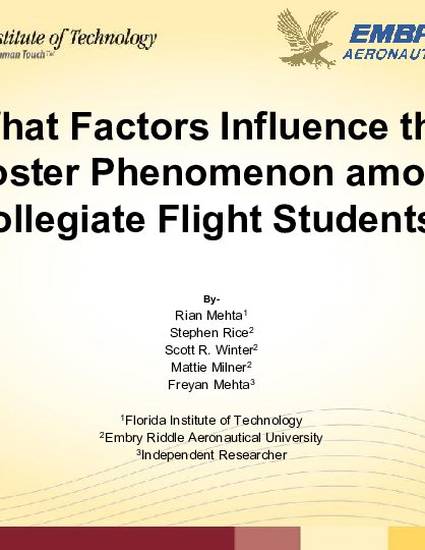
- Imposter Phenomenon,
- Collegiate Pilots,
- Regression Analysis
The need for commercial airline pilots has been increasing significantly, and with the mandatory retirements projected in the next decade, the airline pilot workforce will have an injection of younger pilots. Previous research has studied the effects and prevalence of the Imposter Phenomenon (IP) in young professionals, especially graduate students, and academics. The phenomenon is particularly prevalent for female graduate students and academics. The purpose of this study is to observe the prevalence of the Imposter Phenomenon in collegiate pilots. Participants for the study are recruited from amongst collegiate flight students enrolled in a 4-year aviation university in Florida. A multiple regression analysis using backward stepwise regression will be employed to determine which factors influence the presence of Imposter Phenomenon in collegiate Part 141 pilots. 11 factors are tested as potential predictors (independent variables) in the study. These are age, gender, ethnicity, education level, total flight hours, pilot certification level, personality, measure of self-efficacy, measure self-handicapping, and perceived organizational support. The dependent variable will the participants level of Imposter Phenomenon, measured by using the 20-question validated Clance (1985) Imposter Phenomenon scale. The data collection process in currently underway, with the data analysis and results being completed and compiled by the end of 2019. This is an initial study in a line of future studies seeking to collect data from outside the collegiate pilot population, with the objective of creating a prediction model of Imposter Phenomenon within the United States pilot population.
Dr. Rian Mehta is an Assistant Professor in the College of Aeronautics at Florida Institute of Technology. He received his Ph.D. in Aviation Sciences from Florida Institute of Technology. He has over 80 peer reviewed journal articles and conference proceedings citations to his name. His research has focused predominantly on consumer perceptions, cockpit design and configuration, along with an emphasis on regression models and mediation analyses.
Available at: http://works.bepress.com/scott_winter/50/

Presented during Concurrent Session 8B: Pilot Supply